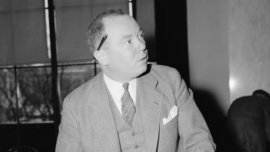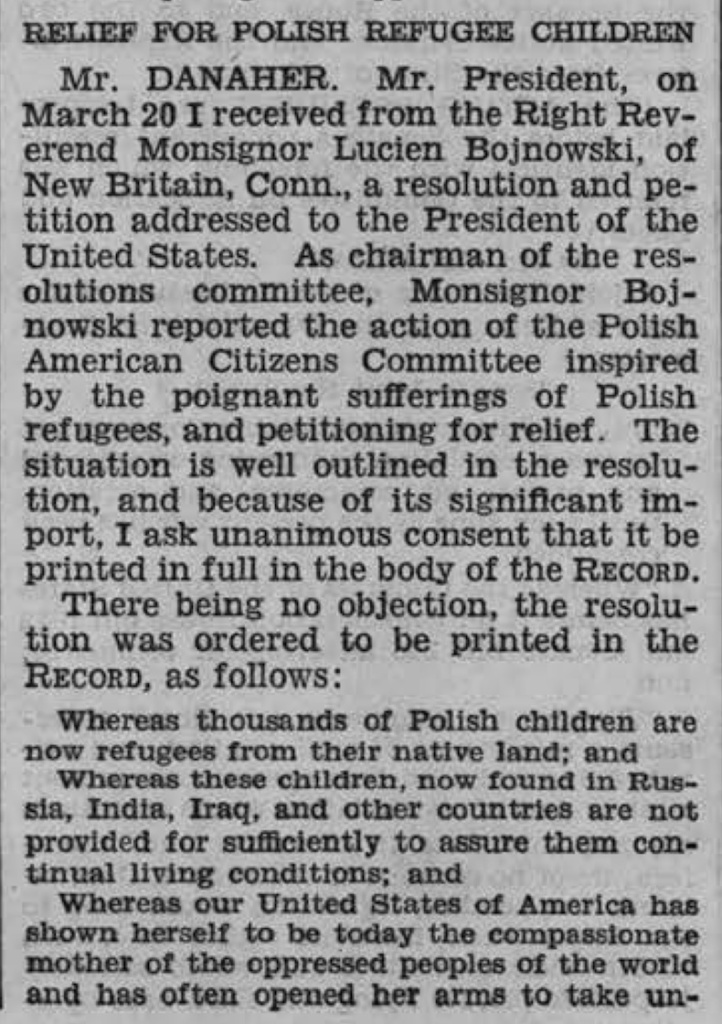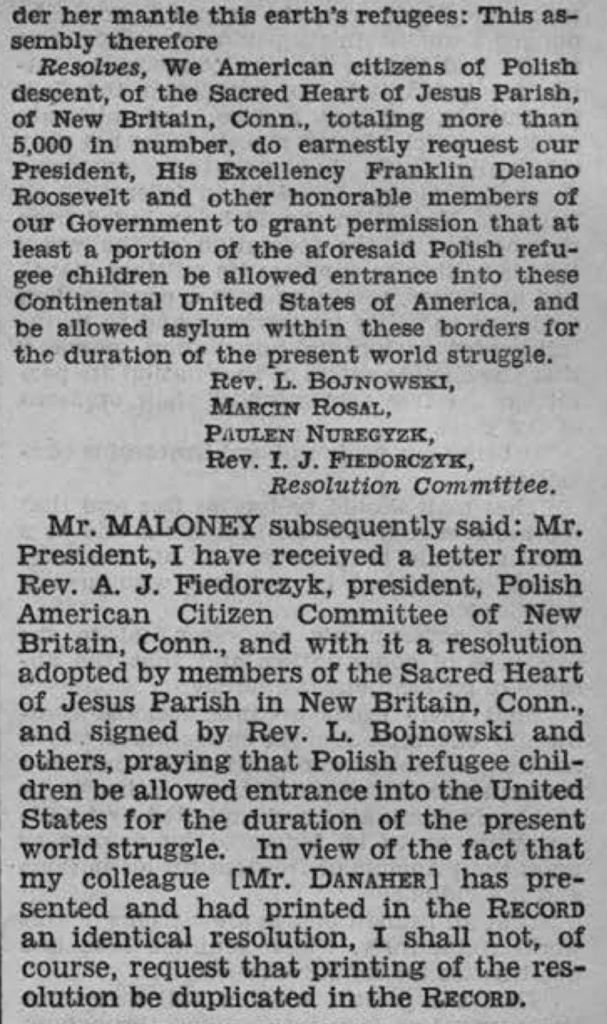Throughout World War II, the arrests and forced deportations of Polish families to labor camps ordered by Soviet dictator Joseph Stalin received practically no mainstream media coverage in the United States. After the Soviet Union became an important military ally against Nazi Germany with the sudden collapse of Stalin’s alliance with Hitler following the German attack on Russia in June 1941, the propaganda agency of the Roosevelt administration—the Office of War Information (OWI)—deliberately covered up Stalin’s crimes, both the deportations of millions of people to Siberia and the mass executions in April and May of 1940 of Polish prisoners of war, known as the Katyń massacre. OWI’s Voice of America shortwave radio broadcasts to Europe, which were prepared and voiced by a team composed mainly of Soviet sympathizers, including Communists hired by first VOA Director John Houseman, repeated Soviet propaganda and disinformation about the Polish deportees who had survived their imprisonment and slave labor in Russia and about the 1940 murder of over 20,000 Polish military officers, government officials, and intellectuals carried out secretly by the Soviet NKVD on orders signed by Stalin and the Communist Party Politburo. While some Roosevelt administration propagandists could have claimed that they did not know that the Soviet Union was behind the Katyń murder, they lied later in the war about Polish refugee women and children who, in 1942, were evacuated from Soviet Russia. The Office of War Information created a false narrative in order not to offend Stalin and to protect his reputation in the United States.
Not all high-level officials in the Roosevelt administration were in favor of appeasing Stalin. A few progressive New Deal Democrats, including Roosevelt’s close friend and advisor Under Secretary of State Sumner Welles, warned the White House about Soviet influence in the U.S. Office of War Information and its overseas radio division, which produced what would later be called Voice of America programs. Welles told the White House in April 1943 in a secret memo that the first VOA director John Houseman was hiring communists. The State Department, supported by the U.S. Army Intelligence, refused to issue a U.S. passport to Houseman for government travel abroad. Houseman was forced to resign. Welles’ warning was not publicized. His memo to the White House remained classified for several decades. Sumner Welles also played a key role in arranging for getting Mexico to accept a group of Polish children refugees and for U.S. assistance for Polish refugees. 1
One of the Soviet lies repeated in U.S. government propaganda was that the Polish refugees were fleeing from being victims of Nazi occupation when in fact they were deported by the Russians from the part of Poland occupied by the Soviet Union. The Roosevelt administration would not allow Polish refugee children saved from Russia to be given political asylum in the United States. The U.S. government helped, however, in transporting some of them to Mexico which had offered asylum for the duration of the war with the understanding that the adults would not seek employment in Mexico and the cost of their stay would be covered by the Polish government in exile. The Roosevelt administration provided three million dollars to the Polish government for the resettlement of refugees but also made sure that while the Polish refugee children and their caretakers were briefly on the U.S. territory on their way to Mexico, they would not come in contact with American journalists to tell the story of their captivity and slave labor in Russia. The children were housed for a few days in a former internment camp for Japanese-Americans and quickly transported through California and Texas in sealed trains with blocked-out windows. They were being guarded by friendly but armed U.S. Army soldiers who were to make sure that Polish refugees would not be seen by news reporters or ordinary Americans.
Many American journalists were deceived by the U.S. government propaganda, but most Polish-American newspapers and radio stations were not.2 They reported on the Soviet deportations and Stalin’s other crimes despite Roosevelt administration officials trying to censor such news and shut down some of the ethnic media outlets in the United States which dared to expose Soviet atrocities.

Some U.S. lawmakers and a few mainstream American reporters were also not deceived by Soviet and U.S. government propaganda. Some liberal members of the Roosevelt administration were also concerned about Soviet influence at the Office of War Information and the Voice of America. Under Secretary of State Sumner Welles wrote a secret memorandum on April 6, 1943 to Marvin H. McIntyre, Secretary to the President, explaining why the State Department would not issue a U.S. passport to the first VOA director John Houseman for official government travel. Welles and other senior State Department and Pentagon officials, including General Dwight Eisenhower, were alarmed by VOA’s overly zealous pro-Soviet and pro-communist propaganda.
During World War II, Senator John A. Danaher (R-Connecticut) was among several U.S. lawmakers of both parties who were also trying to expose Soviet influence over the Office of War Information and Voice of America broadcasts. He and others were demanding that the Roosevelt administration fire pro-Soviet OWI and VOA officials and broadcasters and be prevented from propagandizing to Americans and engaging in partisan propaganda paid for by U.S. taxpayers. These wartime propaganda abuses by OWI and VOA contributed later to the passage of the 1948 Smith-Mundt Act, which restricted distribution in the United States of news prepared by the agencies of the U.S. government. The primary purpose of the Smith-Mundt Act was, however, to provide authorization for U.S. government’s information activities abroad. Still, even during World War II, the U.S. Congress severely limited funding for the Roosevelt administration’s domestic propaganda activities.
At the end of World War II, President Roosevelt, without the knowledge of the Polish government in exile and the Polish-American community, betrayed Poland—America’s wartime ally, the first country attacked by Nazi Germany in World War II, and the first country that fought back against Hitler—and agreed along with British Prime Minister Winston Churchill that Soviet Russia be given the territory of eastern Poland which had been occupied by the Soviet Union in 1939 under the Hitler-Stalin Pact.
The Polish children and other refugees who had left Russia in 1942 for Iran and needed to be resettled for the duration of the war represented a propaganda threat to both Soviet Russia and the Roosevelt administration, which was presenting the Soviet Union and Stalin to the American people and through Voice of America broadcasts to people abroad as forces for peace, security, and democracy . The Polish refugees were living witnesses of Soviet brutality. While not totally indifferent to their suffering, President Roosevelt wanted them to be isolated and silenced so they would not threaten the military alliance with Russia and his political deals with Stalin for the post-war settlement in Europe.
In March 1943, Senator Danaher inserted into the Congressional Record an appeal from the Polish-American community to allow the Polish orphans who were evacuated from the Soviet Union to stay in the United States. The Roosevelt administration ignored the plea. The Polish children were briefly kept under guard at a former detention camp for Japanese Americans before being transported in sealed trains to Mexico. It is worth noting that many Jews, including Jewish children trying to find refuge in the United States, were often also refused asylum by the Roosevelt administration. Some of them were later murdered in German extermination camps.
The same appeal was supported on the floor of the U.S. Senate by Senator Danaher’s colleague, Democratic Senator from Connecticut Francis T. Maloney. An appeal from a Democratic Senator also had no effect on the Roosevelt administration.
RELIEF FOR POLISH REFUGEE CHILDREN
Mr. DANAHER. Mr. President, on March 20 I received from the Right Reverend Monsignor Lucien Bojnowski, of New Britain, Conn., a resolution and petition addressed to the President of the United States. As chairman of the resolutions committee, Monsignor Bojnowski reported the action of the Polish American Citizens Committee inspired by the poignant sufferings of Polish refugees, and petitioning for relief. The situation is well outlined in the resolution, and because of its significant import, I ask unanimous consent that it be printed in full in the body of the RECORD.
There being no objection, the resolution was ordered to be printed in the RECORD, as follows:
Whereas thousands of Polish children are now refugees from their native land; and
Whereas these children, now found In Russia, India, Iraq, and other countries are not provided for sufficiently to assure them continual living conditions; and
Whereas our United States of America has shown herself to be today the compassionate mother of the oppressed peoples of the world and has often opened her arms to take under her mantle this earth’s refugees: This assembly therefore
Resolves, We American citizens of Polish descent, of the Sacred Heart of Jesus Parish, of New Britain, Conn., totaling more than 5,000 in number, do earnestly request our President, His Excellency Franklin Delano Roosevelt and other honorable members of our Government to grant permission that at least a portion of the aforesaid Polish refugee children be allowed entrance into these Continental United States of America, and be allowed asylum within these borders for the duration of the present world struggle.
Rev. L. BOJNOWSKI,
MARCIN ROSAL,
PAULEN NUREGYZK
Rev. I. J. FIEDORCZYK, Resolution Committee
Mr. MALONEY subsequently said: Mr. President, I have received a letter from Rev. A. J. Fiedorczyk, president, Polish American Citizen Committee of New Britain, Conn., and with it a resolution adopted by members of the Sacred Heart of Jesus Parish in New Britain, Conn., and signed by Rev. L. Bojnowski and others, praying that Polish refugee children be allowed entrance into the United
States for the duration of the present world struggle. In view of the fact that my colleague [Mr. DANAHER] has presented and had printed in the RECORD an identical resolution, I shall not, of course, request that printing of the resolution be duplicated in the RECORD.3
Photo Credits

- Title: Washington, D.C., Feb. 17. A new informal picture of Senator John A. Danaher, Republican of Connecticut, 2-17-39
- Creator(s): Harris & Ewing, photographer
- Date Created/Published: 1939 February 17.
- Repository: Library of Congress Prints and Photographs Division Washington, D.C. 20540 USA
- Link

- Title: Connecticut Senator. Washington, D.C., May 31. A new informal photograph of Senator Francis T. Maloney, Democrat of Connecticut
- Creator(s): Harris & Ewing, photographer
- Date Created/Published: [19]39 May 31.
- Repository: Library of Congress Prints and Photographs Division Washington, D.C. 20540 USA
- Link
Notes
- See: Under Secretary of State Sumner Welles April 6, 1943 memorandum to Marvin H. McIntyre, Secretary to the President with enclosures, Franklin D. Roosevelt Library and Museum Website, Box 77, State – Welles, Sumner, 1943-1944; version date 2013, http://www.fdrlibrary.marist.edu/_resources/images/psf/psfb000259.pdf.
- “Happiness in California,” Time, November 15, 1943, 23. Also see: Ted Lipien, “Polish children refugees — TIME and OWI/VOA propaganda,” Silenced Refugees, January 9, 2019, https://silencedrefugees.com/polish-children-refugees-time-and-owi-voa-propaganda/.
- 86 Cong. Rec. (Bound) – Senate: March 23, 1943, 2320, https://www.govinfo.gov/content/pkg/GPO-CRECB-1943-pt2/pdf/GPO-CRECB-1943-pt2-16-1.pdf.





